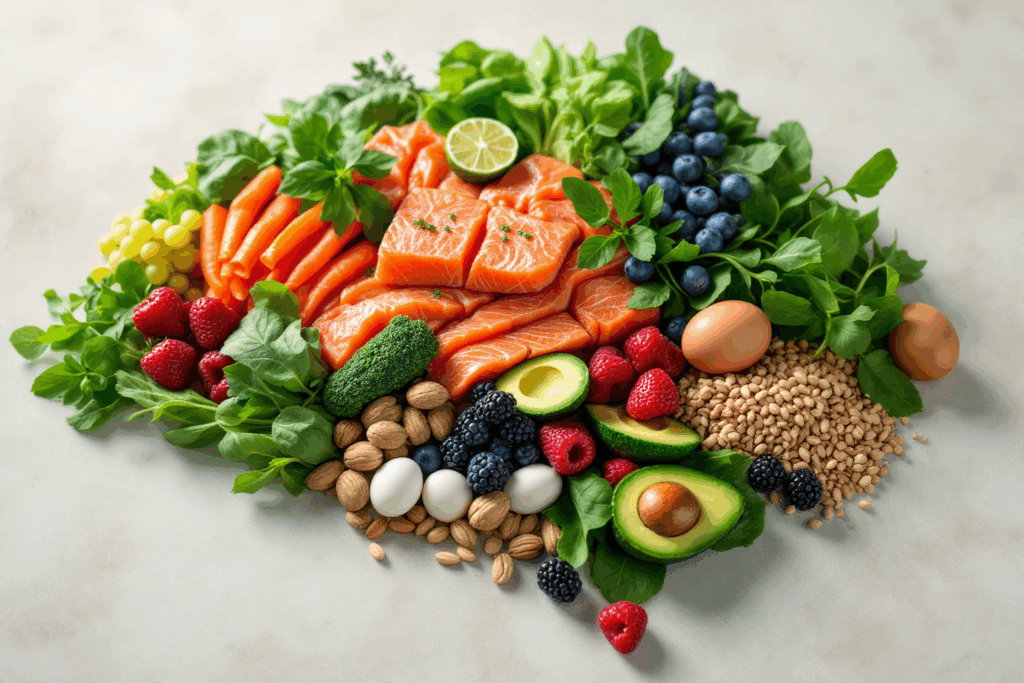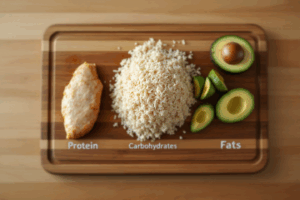
Present Perfect Simple 6
English Blogs “Let’s Learn, Explore, and Connect to the World” Present Perfect Simple 6 VI. Expanding Your Practice with the Present Perfect Simple To achieve


 Lately, the link between nutrition and mental health has garnered significant interest from researchers, medical professionals, and the general public. This burgeoning field of study explores how what we eat directly affects the way we feel, think, and behave. Traditional diets, once evaluated solely for their physical health benefits, are now being scrutinized for their impact on mental well-being. As the global burden of mental health disorders continues to rise, understanding the potential of dietary strategies to alleviate symptoms of depression, anxiety, and other mental conditions is more crucial than ever.
Lately, the link between nutrition and mental health has garnered significant interest from researchers, medical professionals, and the general public. This burgeoning field of study explores how what we eat directly affects the way we feel, think, and behave. Traditional diets, once evaluated solely for their physical health benefits, are now being scrutinized for their impact on mental well-being. As the global burden of mental health disorders continues to rise, understanding the potential of dietary strategies to alleviate symptoms of depression, anxiety, and other mental conditions is more crucial than ever.
 This exploration is not merely academic; it has profound practical implications for daily living. The adage “you are what you eat” extends beyond physical health, suggesting that our food choices might influence our emotional and cognitive functions. This blog aims to unpack what current science says about the role of nutrition in mental health. By delving into how different nutrients, diets, and eating patterns affect mental health, we seek to provide insights that can help individuals make informed dietary choices for both physical and mental well-being. Join us in examining the intricate connection between our diet and mental health, supported by the newest scientific findings.
This exploration is not merely academic; it has profound practical implications for daily living. The adage “you are what you eat” extends beyond physical health, suggesting that our food choices might influence our emotional and cognitive functions. This blog aims to unpack what current science says about the role of nutrition in mental health. By delving into how different nutrients, diets, and eating patterns affect mental health, we seek to provide insights that can help individuals make informed dietary choices for both physical and mental well-being. Join us in examining the intricate connection between our diet and mental health, supported by the newest scientific findings.
 Mental health encompasses our emotional, psychological, and social well-being. It influences how we think, feel, and behave in daily life. It influences our stress management, our relationships with others, and our decision-making processes. Mental health is essential to our ability, both collectively and individually, to process thoughts, experience emotions, engage socially, work, and appreciate life. Consequently, the advancement, safeguarding, and recovery of mental health are critical concerns for individuals, communities, and societies worldwide.
Mental health encompasses our emotional, psychological, and social well-being. It influences how we think, feel, and behave in daily life. It influences our stress management, our relationships with others, and our decision-making processes. Mental health is essential to our ability, both collectively and individually, to process thoughts, experience emotions, engage socially, work, and appreciate life. Consequently, the advancement, safeguarding, and recovery of mental health are critical concerns for individuals, communities, and societies worldwide.
 With conditions such as depression and anxiety on the rise globally, understanding the underlying factors that contribute to mental health is more important than ever. Depression is a primary cause of disability around the world, impacting nearly 264 million people globally. Additionally, millions suffer from anxiety disorders, such as panic disorder, obsessive-compulsive disorder (OCD), and various phobias. These disorders can significantly impair an individual’s ability to function daily and can lead to profound personal and social consequences.
With conditions such as depression and anxiety on the rise globally, understanding the underlying factors that contribute to mental health is more important than ever. Depression is a primary cause of disability around the world, impacting nearly 264 million people globally. Additionally, millions suffer from anxiety disorders, such as panic disorder, obsessive-compulsive disorder (OCD), and various phobias. These disorders can significantly impair an individual’s ability to function daily and can lead to profound personal and social consequences.
Despite the increasing visibility of mental health issues, there remains a pervasive stigma associated with admitting to mental health struggles, which can hinder individuals from seeking help. Mental health isn’t just about avoiding problems – it’s about thriving! It means having the ability to live a rich and fulfilling life where you can tap into your creativity and embrace new experiences. It also includes the strength and resilience to bounce back from challenges that life throws your way. So, mental health is about feeling good and functioning well, not just the absence of illness. Effective strategies for maintaining mental health and wellness are thus crucial not only for preventing or managing mental illness but also for ensuring quality of life and overall health.
 In this context, the role of nutrition—often underappreciated—can be significant. It turns out what you eat isn’t just about your physical health – it can also affect your mental well-being! Recent studies show a strong connection between diet and mental health. The food you choose can influence everything from how your brain functions to how stable your emotions feel. So, just like taking care of your body through diet, making healthy food choices can be a big step towards taking care of your mind, too. By understanding the essential role that proper nutrition plays in mental health, we can better equip ourselves to maintain it in a holistic and effective manner.
In this context, the role of nutrition—often underappreciated—can be significant. It turns out what you eat isn’t just about your physical health – it can also affect your mental well-being! Recent studies show a strong connection between diet and mental health. The food you choose can influence everything from how your brain functions to how stable your emotions feel. So, just like taking care of your body through diet, making healthy food choices can be a big step towards taking care of your mind, too. By understanding the essential role that proper nutrition plays in mental health, we can better equip ourselves to maintain it in a holistic and effective manner.
Nutrition is vital for overall health, including mental wellness. It supplies the essential components needed for the body to create enzymes, hormones, and neurotransmitters that regulate brain activity. A balanced diet helps sustain the brain’s structure and protects it against oxidative stress, which can damage brain cells.

Macronutrients such as proteins, carbohydrates, and fats are crucial for maintaining brain health. Carbohydrates are the brain’s primary source of energy. They influence mood and brain function by providing glucose and impacting the synthesis and release of neurotransmitters like serotonin and dopamine. Proteins, broken down into amino acids, are critical for neurotransmitter function, which directly affects mood and cognition. Fats, mainly omega-3 fatty acids, are essential for the structural integrity of the brain. They form cell membranes and are crucial for the development and function of the brain and nervous system.
 Micronutrients are equally vital. Minerals and vitamins such as vitamin D, B vitamins, iron, magnesium, and zinc play significant roles in brain function. For example, B vitamins are involved in the synthesis of neurotransmitters and energy production. Vitamin D is associated with regulating mood and cognitive abilities. Zinc and magnesium are crucial for neurotransmitter activity, and a deficiency in these can lead to depressive symptoms.
Micronutrients are equally vital. Minerals and vitamins such as vitamin D, B vitamins, iron, magnesium, and zinc play significant roles in brain function. For example, B vitamins are involved in the synthesis of neurotransmitters and energy production. Vitamin D is associated with regulating mood and cognitive abilities. Zinc and magnesium are crucial for neurotransmitter activity, and a deficiency in these can lead to depressive symptoms.
 Antioxidants, found in various fruits and vegetables, combat oxidative stress that may lead to neuronal damage. Foods rich in antioxidants can thus support brain health by protecting against cell damage.
Antioxidants, found in various fruits and vegetables, combat oxidative stress that may lead to neuronal damage. Foods rich in antioxidants can thus support brain health by protecting against cell damage.
Understanding the impact of these nutrients on the brain illustrates why a nutritious diet is important for mental health. Deficiencies in specific nutrients can lead to changes in brain function, manifesting as mood disorders or cognitive decline. For both your mind and body to thrive, you need a rainbow on your plate! Fuel your brain for peak performance! Imagine your brain as a high-performance computer. Ditch the junk food and feed your brain a feast! A balanced diet with minerals, vitamins, and healthy fats is like a gourmet meal for your mind. It provides all the essential building blocks your brain craves to keep you feeling focused, energized, and ready to conquer your day. So next time you’re making food choices, think about giving your brain the upgrade it deserves! It’s like giving your brain all the tools it needs to stay sharp and resilient.
The expanding discipline of nutritional psychiatry investigates the connection between diet and mental health, offering strong evidence that our dietary choices greatly affect our brain function and emotional health. A variety of studies have illuminated this connection, underscoring the potential of dietary interventions in preventing and managing mental health disorders.

Numerous extensive epidemiological studies have established a solid link between a nutritious diet and a lower risk of depression and anxiety. Studies are showing a real connection between food and mood. For example, a research project called the SMILES trial was one of the first to look at how changing your diet can affect mental health. In this study, people who followed a Mediterranean diet for three months felt a significant improvement in their depression symptoms compared to a group that just received support and didn’t change their diet. This suggests that what you eat can be a powerful tool for managing your mental well-being. This study highlighted not just the potential for dietary changes to effect significant improvement in depressive symptoms but also its cost-effectiveness and accessibility as a treatment strategy.
Likewise, studies on the ketogenic diet, which is rich in fats and low in carbohydrates, indicate that it might help reduce symptoms of depression and bipolar disorder. The diet’s impact on brain chemistry, particularly its ability to stabilize neurotransmitter levels and reduce inflammation, is thought to account for these benefits.

Not getting enough of certain nutrients can really impact your mood. Studies have shown that low levels of things like omega-3s, zinc, magnesium, and B vitamins can be linked to a higher risk of feeling down or anxious. Omega-3s are especially important for brain health because they influence chemicals in your brain called neurotransmitters, which play a role in mood. Vitamin D is also crucial for your brain’s development and how it works, and if you don’t have enough, you might be more prone to mood disorders. So, making sure you get the right nutrients is important for both your physical and mental health!

There is increasing evidence supporting the inflammatory hypothesis of depression, which posits that inflammation significantly contributes to the condition. Research suggests a strong link between diet and mood. Diets loaded with sugary treats and fatty foods can crank up inflammation in your body, which might be linked to feeling down. On the other hand, filling your plate with colorful fruits and veggies, fish, and whole grains is packed with anti-inflammatory goodness. This can help keep inflammation in check and potentially improve your mood. So, next time you’re making choices at the grocery store, keep in mind that healthy foods can be a mood booster, too!

Eating healthy isn’t a magic bullet for mental health, but science shows it can be a game-changer. Imagine your mental well-being as a puzzle. A balanced diet can be a key piece that fits alongside other treatments to create a strong overall plan. By taking care of your nutrition, you’re taking an important step toward feeling your best. Nutritional interventions can be used alongside medication and psychotherapy to enhance outcomes. For healthcare professionals, understanding the nutritional basis of mental health can be crucial in advising and treating patients with dietary modifications that may improve clinical outcomes.
These insights into the relationship between diet and mental health not only reinforce the importance of a balanced diet for maintaining overall health but also highlight the potential for targeted nutritional interventions in mental health care. As research continues to evolve, it is likely that dietary recommendations will become increasingly tailored to individual mental health conditions, enhancing the efficacy of traditional treatment methods.
The influence of specific dietary patterns on mental health has garnered significant interest in recent years. Research has particularly focused on how certain diets — like Mediterranean, ketogenic, and plant-based diets — impact mental well-being, often contrasting these with the effects of diets high in processed foods and sugars.

The Mediterranean diet might be more than just delicious food for sunny vacations! Packed with vegetables, fruits, nuts, whole grains, and fish, it’s known for its focus on healthy fats like olive oil. Research suggests this way of eating can benefit your mental health, too. The Mediterranean diet is loaded with brain-boosting nutrients like omega-3s, antioxidants, and fiber. These work together to fight inflammation, which can be linked to depression. Studies like the Predimed trial even show that people who stick to this diet tend to have a lower risk of feeling down over time. So, the next time you’re looking for ways to support your mental well-being, consider filling your plate with some Mediterranean sunshine!

The ketogenic diet, which is low in carbohydrates and high in fats, forces the body to burn fats rather than carbohydrates. Originally developed as a treatment for epilepsy, recent findings suggest that it may also benefit mental health by stabilizing mood and reducing symptoms in conditions like depression and bipolar disorder. The diet enhances the production of ketones in the body, which provides an alternative energy source for the brain and helps increase levels of neurotransmitters like GABA, which can promote relaxation and reduce anxiety. Sticking with the keto diet for a long time can be tough, and the jury’s still out on exactly how much it helps or hurts your mental health in the long run. More research is needed to get a clearer picture of its pros and cons for your mood and overall well-being.

Plant-based diets, which are high in vegetables, fruits, nuts, seeds, and whole grains, are also beneficial for mental health. These diets ditch processed foods and focus on whole foods instead. They’re packed with vitamins, minerals, and antioxidants. These nutrients act like tiny warriors in your body, fighting off free radicals (unstable molecules) that can damage cells and contribute to inflammation. Less inflammation might mean a happier, healthier you! Observational studies have linked vegetarian and vegan diets with lower levels of depression compared to diets high in meat and animal products, suggesting that plant-based nutrients may play a role in improving mood.

Conversely, diets high in refined sugars and processed foods are detrimental to mental health. Skip the fries and sugary drinks! This type of diet might be bringing you down more than you realize. Research shows a strong link between fast food and sugary treats and feeling low or anxious. These diets can trigger inflammation, mess with your gut health, and cause blood sugar spikes and crashes, all of which can zap your mood and energy. So, the next time you’re reaching for a quick bite, think twice – a healthier choice could be a mood-booster in disguise!
What you eat can have a big impact on how you feel. Filling your plate with whole, unprocessed foods like fruits, veggies, and whole grains gives your body the nutrients it needs to thrive. This can have a positive effect on your mental health, too! On the other hand, diets loaded with sugary treats and processed foods might be dragging you down more than you realize. Studies show a link between these unhealthy choices and feeling low or anxious. So, the next time you’re making food choices, remember that healthy eating can be a delicious way to boost your mood and well-being! Tailoring one’s diet to include more anti-inflammatory and antioxidant-rich foods can be a strategic part of managing and potentially improving mental health outcomes.
The connection between the gut and the brain, often referred to as the gut-brain axis, is a critical area in understanding mental health. Recent scientific advances have shed light on how gut health significantly influences mental well-being, emphasizing the importance of a healthy microbiome.
It’s a surprising fact, but your gut and brain are actually best buds! They have a direct line of communication, constantly sending messages back and forth. This amazing network is called the gut-brain axis, and it plays a big role in how you feel both physically and mentally. This amazing network called the gut-brain axis, connects your feelings and thinking (like your emotions and memory) in your brain with what’s going on down in your intestines. It’s a complex system, but basically, your gut health can influence your mental well-being and vice versa. This bidirectional pathway is mediated by various mechanisms, including neural, immune, endocrine, and humoral links. For instance, the vagus nerve is one of the primary connections between the brain and the gut, transmitting signals in both directions.
There’s a whole universe of tiny creatures living inside your gut! These bacteria aren’t just hanging out – they play a super important role in digestion, keeping bad guys out, and even producing essential nutrients and brain chemicals. Research suggests that the specific mix of these gut bacteria can influence the production of mood-regulating chemicals like serotonin (mostly made in the gut!) and GABA. So, the health of your gut bacteria might be linked to how you feel! Imbalances in gut bacteria can lead to dysregulation of these pathways, potentially contributing to anxiety and depression.
Interventions that target gut health, such as the consumption of probiotics and prebiotics, can influence mental health outcomes. Think of your gut as a garden. Probiotics are like friendly new plants you add to help the good stuff grow. Prebiotics, on the other hand, are like fertilizer that nourishes the existing beneficial bacteria already in your gut, helping them thrive. Both probiotics and prebiotics contribute to a healthy gut environment. Studies have suggested that supplements containing probiotics can improve symptoms of depression and anxiety, likely by strengthening the gut-brain axis.
There’s a fascinating link between your gut and your mood! It turns out the tiny bacteria living inside you (called gut microbiome) play a big role in how you feel. Those delicious fruits, veggies, and whole grains aren’t just good for you – they’re like a superfood for the good bacteria living in your gut! Just like plants need fertilizer to flourish, these good bacteria benefit from the nutrients in these healthy foods. When they thrive, they contribute to a healthy gut environment, which research suggests can even impact your mood in a positive way. On the other hand, processed foods and sugary drinks can harm them. Since a healthy gut seems to be connected to a happy mind, this is a strong reason to choose gut-friendly foods. It’s like giving your mental health a natural boost from the inside out! Research on the gut-brain connection is ongoing, but so far, it suggests that taking care of your gut microbiome through diet could be a powerful tool for managing mental well-being.
Adopting a diet that benefits mental health doesn’t require drastic changes. Instead, small, sustainable adjustments can make a significant difference. Here are some practical tips for incorporating nutritional strategies into everyday life to enhance mental well-being:
 Ditch the processed stuff and fill your plate with a rainbow of goodness! Fill your plate with a rainbow of goodness! Choose fruits, veggies, whole grains, lean protein, and healthy fats to fuel your body and mind. These nutrient powerhouses provide the essential building blocks your brain needs to function at its best. Plus, they support your overall health and well-being, keeping you feeling energized and ready to take on the day.
Ditch the processed stuff and fill your plate with a rainbow of goodness! Fill your plate with a rainbow of goodness! Choose fruits, veggies, whole grains, lean protein, and healthy fats to fuel your body and mind. These nutrient powerhouses provide the essential building blocks your brain needs to function at its best. Plus, they support your overall health and well-being, keeping you feeling energized and ready to take on the day.
Include sources of omega-3 fatty acids like fish (salmon, mackerel, and sardines), flaxseeds, and walnuts in your diet. Omega-3s are known to reduce inflammation and are linked to improved mood and cognitive function.
Adequate hydration is crucial for maintaining optimal brain function and overall health. Make sure to drink plenty of water throughout the day.
Reduce intake of foods high in refined sugars and processed ingredients, which can exacerbate inflammation and impact mood stability.
It’s commendable to strive for a healthier diet. f you have any existing health concerns, a chat with your doctor or a dietitian is a must before making big dietary changes. This ensures a personalized approach that effectively meets your unique nutritional needs. They can help you create a personalized plan that ensures you’re getting all the nutrients your body needs to thrive. Think of it as getting expert advice to make sure your healthy eating journey is safe and effective!
These simple steps can help individuals leverage the power of nutrition to support their mental health, contributing to a healthier, more balanced lifestyle.
 It’s exciting to see how much science is revealing about the link between food and mood! We used to think about food just as fuel for our bodies, but research now shows it can also play a major role in our mental well-being. Choosing whole foods, omega-3s, and probiotics while limiting processed foods and sugar can significantly boost how we feel. As we learn more about the gut-brain connection and how it’s influenced by what we eat, it’s becoming clear that our dietary choices are a powerful tool for taking care of our mental health. So next time you reach for a snack, remember – you might be giving your brain a boost along with your body! Empowered with this knowledge, individuals can make informed decisions to support both their physical and mental health.
It’s exciting to see how much science is revealing about the link between food and mood! We used to think about food just as fuel for our bodies, but research now shows it can also play a major role in our mental well-being. Choosing whole foods, omega-3s, and probiotics while limiting processed foods and sugar can significantly boost how we feel. As we learn more about the gut-brain connection and how it’s influenced by what we eat, it’s becoming clear that our dietary choices are a powerful tool for taking care of our mental health. So next time you reach for a snack, remember – you might be giving your brain a boost along with your body! Empowered with this knowledge, individuals can make informed decisions to support both their physical and mental health.

English Blogs “Let’s Learn, Explore, and Connect to the World” Present Perfect Simple 6 VI. Expanding Your Practice with the Present Perfect Simple To achieve

Common English Errors Blogs “Let’s Learn, Explore, and Connect to the World” Your vs. You’re: Simplifying English for Everyday Use Introduction In the intricate tapestry
Laugh and learn with ‘Comic Collections’ by Cassia North – a delightful dive into everyday conversations in professional and casual settings, now in a vibrant, humor-filled ebook. Perfect for all ages!



